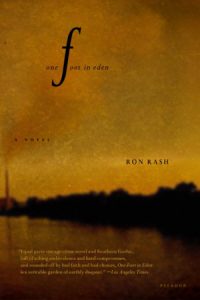Book Group Guide
Introduction to One Foot In Eden
A richly textured story of love and murder, One Foot In Eden unfolds through the distinctive voices of a small-town sheriff, a young married couple, and those who share in their secrets.
Will Alexander knows there’s been a murder in this fertile corner of the Appalachian South, but he can’t find a body and no one’s coming talking, least of all Billy Holcombe and his beautiful wife, Amy. For years, the mystery will go unsolved – until the day the power company forces everyone out and floods the valley and family farms where this close-knit community has lived and worked for generations.
Author Ron Rash has crafted a story of haunting beauty and primitive force, tempered by his deep affection for a region often misunderstood. One Foot In Eden is a tribute to a time, place, and way of life vanishing from the modern South.
Reading Group Guide Questions
1. The challenge for a modern novelist who has characters speaking in dialect is how to give a flavor for regional speech without having the dialogue be intrusive or, worse, having it reduce characters to stereotypes or caricatures. Discuss the effectiveness of the dialect in the novel, focusing not only on vocabulary but also syntax. Also look at the relationship between the social standing of characters and their manner of speaking.
2. Discuss the interplay between rationality and irrationality. Several characters certainly would be associated with one or the other, but the traits often mingle (Billy killing Holland but then carefully reasoning out the hiding of the body.) A primitive urge–the desire to have a child–and Glendower’s dark magic combine to set the tragedy in motion after a doctor scientifically confirms the sterility. Alexander intuits that something isn’t right but also uses logic to unravel the murder. Isaac seems to have both elements coursing through him, etc.
3. What does it mean to say that this is very much an Old Testament story? Discuss the various links: names, the title and epigraph, the flood, the harsh retribution and consequences for sin, dispossession, etc. How do the language and setting combine to create an Old Testament tone?
4. Does One Foot In Eden feel like a historical novel to you? If so, how is this sense of history evoked? If not, what particulars make it seem timeless or modern? Additionally, how is history of the place tied into the personal histories of the characters?
5. The setting of the novel seems to be of special importance to this story. Geography and psychology are inextricably bound. Discuss how the two mirror and reinforce each other and how the novel’s characters attempt to control the landscape even as they are controlled by it.
6. Being that this terrain is located in the American South, particularly in rural Appalachia, in what ways do the novel or its characters feel “Southern”? Are these people defined by their home, its history and heritage, or are they something more than the place in which they live?
7. Tragedies – from the Bible to ancient Greek theatre to today – often involve characters who admirable or sympathetic but who are also capable of horrible deeds. Would you also consider this to be the case in One Foot In Eden, and if so, which characters would you consider tragic?
8. Why do you think Ron Rash chose to structure the novel as he did, both with the testimonial chapters and the surprising jump forward in time with the Deputy’s chapter?
9. Is Rash trying to impart something beyond the story itself by choosing to tell it in this fashion?
About the Author
Ron Rash holds the Parris Chair in Appalachian Studies at Western Carolina University. He is the author of several collections of short fiction and poetry, and has had his work featured in The Yale Review, Oxford American, Southern Review, and elsewhere. This is his first novel.

